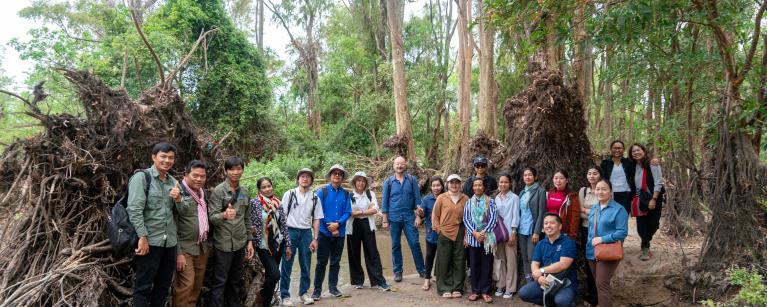Oxfam is honored to host our longstanding donors—the Department of Foreign Affairs and Trade (DFAT) and the Swiss Agency for Development Cooperation (SDC)—to the Inclusion Project’s site nestled in the breathtaking Mekong flooded forest in Stung Treng province. The visit focused on deepening understanding of the project’s implementation and its impact on local communities, particularly the voices of community leaders and inspiring women river defenders who shared their stories, and their vision standing up to protect the river and sustainable future.
The donors engaged directly with local partners such as My Village Organization (MVi) and the Culture and Environmental Preservation Association (CEPA), witnessing firsthand how the project has empowered and strengthened community ownership and leadership to safeguard natural resources and secure sustainable livelihoods.
Ms. Chanthida Ponn, a dedicated woman river defender and community researcher from Preah Romkel village, Stung Treng province, has been at the forefront of efforts to protect the Mekong’s ecosystems through her work in community-based action research. She played a crucial role in raising awareness about environmental challenges facing her community.
“Participating in community-based action research has shown me how critical our river ecosystems are to our lives. I make it a priority to share these insights with policymakers at every level, and I remain committed to amplifying our collective voice to drive meaningful change,” said Chanthida.
In the 3S region (Sesan, Sre Pok, and Sekong Rivers), tributaries of the Mekong, living along Srepok River, Ms. Chany Duk, a prominent woman leader from Sangkum village, Ratanakiri province, has been leading efforts to protect her community and stand up for the river’s future and her community.
“Our water and ecosystems are the foundation of our livelihoods and must be safeguarded for the sake of future generations. ”
“I have worked closely with local authorities and my community to defend our precious water resources. I stood up to a banana plantation company that was illegally pumping water from Boeung Santhov for irrigation—resulting in pollution of the Srepok River, a lifeline that sustains critical ecosystems essential for regional biodiversity and our community’s well-being,” Chany said.
After listening and learning from the community, the donors had heard about their experiences and challenges they face. Amid enlightening exchanges and observing changes in the riverine ecosystem—like the decreasing fish populations and the drying of water due to upstream water infrastructure and impacts of climate change, the experience offered vital insights that will inform the strategic priorities and next phase of the Mekong Inclusion Project. This reflection reinforced our shared commitment to an inclusive, resilient, and sustainable future for riverine communities in the Mekong.
Building on these insights, the next phase of the project will focus on enhancing community-led conservation efforts, strengthening policy advocacy, and expanding partnerships to ensure long-term environmental sustainability and equitable development in the region.
